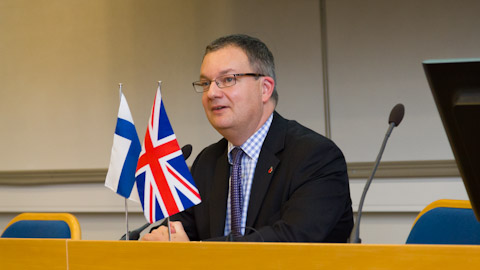The UK Wishes for a More Flexible European Union
Matthew Lodge, the British Ambassador to Finland talked about the possibilities of the European Union and the different perspectives of the UK and the Nordic countries concerning the EU at the public Studia Generalia lecture.

Ambassador Matthew Lodge enjoys staying in Finland and thinks that Finland and the UK have a lot in common.
The recent media coverage about the views of the United Kingdom on the European Union has been negative. Headlines have been filled with news about the UK Prime Minister David Cameron’s EU-speech earlier this year, in which he proposed an EU-referendum for the UK to be organised in 2017. Therefore, when Ambassador Matthew Lodge asked the audience whether they think the UK is anti- or pro-EU, most people in the audience chose the latter.
However, according to Lodge the UK is not in reality as anti-EU as has been reported. Lodge admits that there definitely are challenges in the EU: problems of the Eurozone, the competitiveness crisis and a gap between the EU and its citizens. Nevertheless, the UK wants to stay in the EU, and actually in the heart of it.
The EU Needs to Adapt to Thrive
–A reformed EU membership is extremely important for the UK. Competitiveness should be improved, the diversity of the member states respected, power could be given back to the member states in certain matters and democratic accountability should be enforced, says Lodge.
Lodge argues that the EU should be a means to an end and not the end in itself. He thinks that discussion about the EU is definitely needed, but the EU can offer a lot. The goal should be a more open and a more flexible Europe.
–People want to have a voice and an identity. The European Union has a huge diversity of cultures and languages and this should be respected.
Finland and the UK Have a Lot in Common
Finland is Lodge’s first post as an ambassador and he has truly enjoyed his three and a half year stay in Finland. He feels that the UK and Finland have a lot in common. Both countries face the same challenges and, for example, both countries want to promote budgetary discipline and boost economic growth in the EU.
–In Finland, a Eurosceptic party is in the parliament, and also in the UK Euroscepticism exists inside bigger parties and there are Eurosceptic parties, says Lodge.
In addition, historically both the UK and Finland have a rich trading history. Lodge tells that in spite of these similarities the UK and Finland have different backgrounds that have shaped our countries and cultures. Therefore, our approaches to matters may seem very different.
Matthew Lodge talked at the Studia Generalia lecture series “Emerging trends in the Baltic Sea region” at Turku School of Economics on Monday 4 November.
Jenna Sjöholm